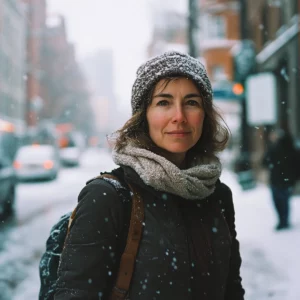It was a normal winter day, but colder than the day before when I went to run errands in town. I came across a young man who was struggling and offered to help. My efforts blessed me with a gift I didn’t expect, one that changed my life forever.
It was one of those bitter January afternoons, the kind where the cold feels personal, sinking into every layer you wear, including your bones, and biting at your face like you’d wronged it. I’d just wrapped up errands when I decided to take a moment to be grateful for all I had. I didn’t know I was about to be a blessing to someone else.
I had just finished grocery shopping and picking up my husband’s dry cleaning when I walked past St. Peter’s Church and decided to step inside for a few quiet moments of reflection. I don’t even remember what made me stop there, maybe it was the need for stillness, a break from the noise of my everyday life.

As I stepped up to the stone entrance, I noticed him sitting at the foot of the steps.
The man looked no older than thirty. His coat was threadbare, his head bare to the cold wind, and his fingers—stiff and red—fumbled helplessly at his shoes, which were falling apart. It wasn’t just that they were worn; the soles were hanging on by sheer will, held together by makeshift pieces of twine. I hesitated. I’m nt proud of that moment, but there’s something about seeing suffering that makes you second-guess stepping in. What if he’s dangerous? What if he doesn’t want my help? But then he looked up.
His face was gaunt and wind-chapped, but his eyes — deep, brown, and hollow — stopped me in my tracks. There was something fragile about him, like one more bad day might break him completely. I couldn’t walk past, no matter how doubtful I was or how hard I tried. Something about him struck a chord and kept me in place. I crouched beside him, my knees protesting as the freezing stone bit through my jeans.
“Hi there,” I said softly. “Please let me help with those shoes.”
He blinked at me with his red, tired, and bloodshot eyes that still held a spark of hope. Startled, as if he wasn’t used to someone noticing him at all, he replied, “You don’t have to —” “Let me,” I cut in, firm but gentle. I dropped my bag beside me and pulled off my gloves. My fingers immediately stung from the cold, but it didn’t matter. I untied the knotted string holding his shoe together and tried to fasten it more securely. He was quiet as I worked, watching me with something I couldn’t place — gratitude, maybe, or disbelief. When I finished, I pulled the scarf from my shoulders. It was my favorite one, a thick gray knit my husband, Ben, had given me years ago.
I hesitated for just a second before draping it over his shoulders. “Here. This’ll help.” His lips parted slightly, like he wanted to say something but couldn’t find the words. I wasn’t done… “Wait here,” I told him. Before he could protest, I darted across the street to a little corner café, where I bought the largest cup of hot soup they had, along with tea. When I returned, his hands were trembling as he accepted it. I took a pen and scrap of paper from my bag, scribbled down my address, and pressed it into his hand.
“If you ever need a place to stay,” I said quietly, “or someone to talk to — come find me.” He stared at the paper, his brow furrowing. “Why?” he asked hoarsely. “Why are you doing this?” “Because everyone needs someone,” I replied. “And right now, you need someone.” His eyes shone for a brief second before he nodded silently and looked back down at the steaming cup of soup in his hands. “Thank you,” he whispered. I left him there, though every part of me wanted to linger. As I walked back to my car, I looked over my shoulder once, just to see him again. He was sipping the soup slowly, his shoulders hunched against the wind. I never even asked his name and never thought I’d see him again.
Ten years passed. Life rolled on the way it does — steadily, with little moments of joy and heartache, with work, friends, family, and routines. My husband and I had celebrated twenty-two years of marriage. Our children, Emily and Caleb, were now teenagers, with our daughter about to graduate high school. Caleb was firmly in the throes of fourteen-year-old sarcasm. Life was full and exhausting, like it is for most families. It was a Tuesday evening when the knock came at the door. I was sitting in the living room, sipping some tea and flipping through bills, while Caleb shouted about losing his video game upstairs. When I opened the door, I froze.
A police officer stood on the porch, his uniform pristine, his face serious. My heart lept into my throat! My first thought was my children. Had something happened at school? An accident? “Good evening, ma’am,” the officer said. “Are you Anna?”









